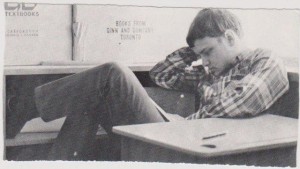(Rick, 17, gr. 12 English class, lost in a book)
“Oh, the glory of growth, silent, mighty, persistent, inevitable! To awaken, to open up like a flower to the light of a fuller consciousness!”–Emily Carr, “Hundreds and Thousands”. The Journals of Emily Carr
What is it that makes ‘you’ uniquely you, quite apart from your soul, spirit, and heart? You were born with a brain and sensibility to perceive and experience this world. Ever since you were young, you have experienced this world and everything in it in terms of consciousness. That is how you understand yourself, others, situations, and the world at large. Generally speaking, you are conscious of various things and experiences, or not. You have acquired a fair bit of consciousness (and subconsciousness) already, though sometimes there are things you choose to put ‘out-of-mind’, out-of-consciousness.
Think for a moment about your life. You are either alive and conscious of that aliveness, or not. You may be a few weeks old and vaguely conscious of a mother feeding you, or a teenager conscious of having done something wrong, or an old person in hospital, listening to and conscious of the machines that may be keeping you alive. Maybe at another point in your life, you hit your head, and lose consciousness. Or maybe you actually forget something and someone you used to know well, or in an extreme case, develop consciousness-damaging dementia.
Consciousness is that important, (self-)defining state in which one is aware of oneself and that which is outside of self. Essentially, it is how we experience each day and how we interact with others and our various environments. It is where we spend most of our days and time, whether we’re sleeping, remembering, or imagining. In life, consciousness always goes with the territory. It is truly who we most and each are. At any given moment, it is summarily the total of what we know, have experienced, and have learned or are learning in our busy, ephemeral, transitory lives.
****************************************************************************************************
In terms of what matters, is most important, or relevant to our lives as individuals would be consciousness or conscious awareness. Watch a baby in its third month starting to become aware of his toys and try to imagine how that baby might feel or how you might have felt with those same toys at that age. Recall an important lesson you learned from a favorite teacher. Remember how the death of a pet or wild animal may have affected you. Recollect your first job and how you learned to work with others.Think back to when you graduated from high school, college, or university. And all the things that stood out or are memorable to you. Perhaps you can even have some recollection of how those moments felt and what specific things you suddenly became aware of.
“Consciousness” is also a good old ’60s word. Back then, when I grew up, young people were all interested in increasing consciousness. For some, this meant a political consciousness as in women’s lib, civil rights, or gay lib. For others, it emerged through such physical things as long hair, different clothing, drugs, and a questioning of or rejection of ’50s-style adult authority. For still others, the consciousness sought was to be found in new writing of the day and different emerging genres of popular music.
But as the third paragraph of the piece states, consciousness is truly larger and more fundamental than some things that emerged in a specific decade in the Western world. What I find most interesting about any other individuals is what they know and what they are aware of. Beyond whatever behavior and action, consciousness is what defines who they are, every bit as much as their values or character.
Worth noting, in passing, is that consciousness can be physical (such as in our response to massage therapy), emotional (such as in our learning from the feelings evoked in relationship conflicts), mental (such as in transcendental meditation), and spiritual (such as in our response to religion or cultural rites). Consciousness is palpable in a number of ways, on a number of levels or dimensions.
In the earliest entry on “Individual Process, Briefly”, I spoke of how so many of us seek missing information, often things we want or need to know and are curious about. That information when found, in turn, satisfies and expands our consciousness, knowledge base, and understanding of ourselves, others, and the world. When we expand our information, we expand ourselves and become ‘larger’, metaphorically speaking. The more we are conscious of, the more we grow innerly–a core manifestation of expanded consciousness.
Later, as we age and look back, we may see that our lives were not just about the things we did and the relationships we had. Instead, we might come to realize how important, basic, and significant consciousness was in defining what we essentially were and in understanding or appreciating what we learned from life and others.

